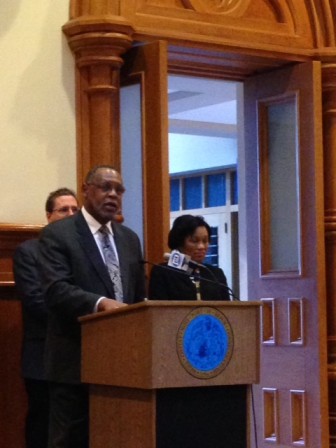The state will use a $4 million federal grant to launch a pilot program in a New Haven neighborhood that officials hope will be a statewide model for improving early identification and treatment of children’s mental health.
The five-year grant, announced Tuesday by the state Department of Children and Families (DCF) and New Haven Mayor Toni Harp, will not add new mental-health services for children, but instead will embed care coordinators and clinicians in schools and pediatric offices, in an effort to catch problems early and improve access to existing programs.

Lisa Chedekel Photo
DCF Deputy Commissioner Michael Williams and New Haven Mayor Toni Harp announce new children’s mental health pilot program.
The grant is targeted to children ages 8 and younger in the city’s Dwight neighborhood, which has a robust network of mental health providers, including Yale-New Haven Hospital.
“This is all about making the existing services more effective and accessible,” DCF Deputy Commissioner Michael Williams said of the grant project, dubbed the Elm City Project Launch. He said the agency selected the Dwight neighborhood because it has a “tremendous array of services” to handle referrals to care resulting from increased mental health screenings. In other areas of the city and state, he acknowledged, “There clearly are a dearth of services” – a problem that the new grant does not address.
The announcement comes just six weeks after DCF submitted a conceptual blueprint to the state legislature calling for an overhaul of the state’s fragmented network of child mental health services. The DCF plan – ordered by state lawmakers in the wake of the Newtown school shootings – calls for more screening of children by pediatricians and schools, and a reallocation of resources to improve uneven access to treatment. DCF has said an overhaul of the system will take years.
While the statewide plan will require large-scale changes to what Williams called the “administrative infrastructure,” he said the New Haven project could serve as a prototype for early identification and referrals to care. A care coordinator will be embedded in Yale-New Haven’s pediatric clinic, and other pediatricians will be trained to screen and refer children with behavioral health problems. Clinicians will work with Dwight neighborhood schools to train staff and improve early identification.
Yale-New Haven and other partners will establish a Young Child Wellness Council to coordinate service providers and build a “seamless” system of care for young children and families, officials said.
A key goal of the project will be ensuring that children get a “hot handoff” to services, meaning a quick referral to care, said Alice Forrester, executive director of the Clifford Beers Clinic, a partner in the project. The state’s emergency rooms have seen increasing numbers of children in mental health crisis, and many families have complained of problems accessing inpatient and outpatient treatment.
The grant money also will support increased outreach to expectant mothers and mothers of young children who may have unmet mental health needs, DCF officials said.
New Haven school Superintendent Garth Harries said school officials are eager to help improve early identification of mental health problems among pre-school and young school-age children.
“Building social and emotional resilience is (part of) the schools’ responsibility,” he said.